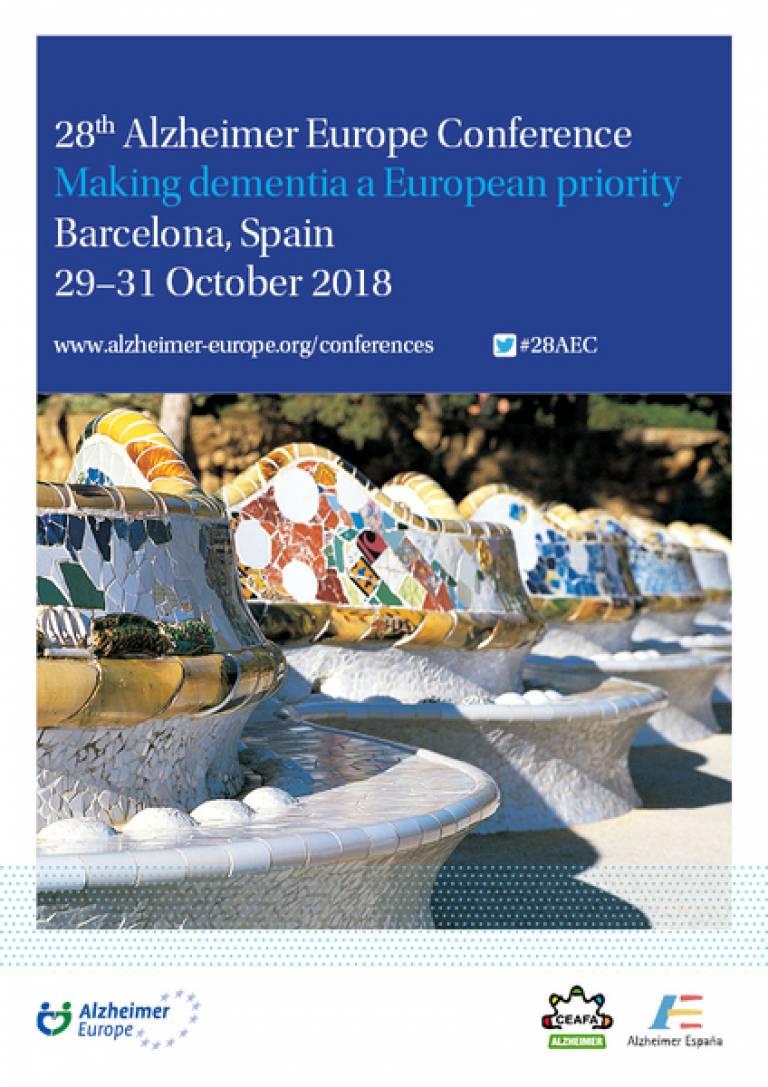NDDR attend 28th Alzheimer Europe Conference
11 December 2018

The 28th Alzheimer Europe Conference (#28AEC) “Making dementia a European priority” was held in Barcelona on 29-31 October 2018. The NIHR Office of the National Director of Dementia Research was there, represented by myself and Piers Kotting.
More than 800 participants from 46 countries attended the conference, which had 239 speakers and 175 poster presenters, from all background, including researchers, community group organisers and people who themselves live with dementia; sharing their research, projects and experiences.
This really is a conference with something for everyone. It brings together policy with science, research and public engagement, sharing with partners from across Europe and is now being attended by many more from across the world, keen to share, learn and collaborate.
Iva Holmerová, Chairperson of Alzheimer Europe (AE) opened the conference, this included a special welcome for the 35 people living with dementia attending the conference, as well as their supporters.
The keynote lecture was delivered by Dr Jose Luis Molinuevo from Barcelona Beta BrainResearch Center. In his presentation “Will we be able to prevent Alzheimer’s disease?” he gave an overview of the challenges and opportunities regarding the prevention of Alzheimer’s disease (AD). He explored the rationale behind preventing AD and the reason why he believes prevention is the key (something we seems to be a common theme amongst many of the speakers I have seen at conferences over the past couple of years).
There were four plenary sessions in total, but I thought I would just give you an overview of those which I managed to attend.
The first plenary session on “Dementia as a policy priority” was chaired by Jesus Rodrigo from Spain and opened with the first of four “Meet the researchers of tomorrow” sessions. Anja Leist, Associate Professor at the University of Luxembourg, presented the World Young Leaders in Dementia (WYLD) network, which brings together young professionals in the field of dementia, supporting the work of the World Dementia Council. The second speaker was Carmen Orte, Director General of IMSERSO (Instituto de Mayores y Servicios Sociales), who presented “Dementia as a health and social priority in Spain”. Geoff Huggins, Director of Health and Social Care Integration at the Scottish Government delivered a presentation on the EU Joint Action (JA) ‘Act on Dementia’, and finally Dr Dan Chisholm, Programme Manager for Mental Health at the World Health Organisation (WHO) presented about prioritising dementia internationally and specifically about the WHO’s Global Action Plan on the public response to dementia 2017-2025. The final speaker in the first plenary was Professor John Gallacher, Project Co-ordinator of the IMI ROADMAP project who shared the work done by the project so far. Discussing how the ROADMAP project aims to deliver a series of methods and tools that will allow the scalable, transferable integration of data on patient outcomes in the real world.
The second plenary session focused on “Dementia as a human rights priority” and was chaired by Charles Scerri (Malta). The session opened with another “Meet the researchers of tomorrow” session, delivered by Stina Saunders, a fellow at the IMI EPAD project (European Prevention of Alzheimer’s Dementia) and a doctoral candidate at the University of Edinburgh. Her talk focused on engaging research participants as collaborators working towards a common goal with the study team. Helen Rochford-Brennan, Chairperson of the European Working Group of People with Dementia (EWGPWD), talked about promoting a human rights-based approach to dementia through the active involvement of people with dementia. Dr Fernando Vicente, advisor to the General Directorate of the Institute of Older People and Social Services (IMSERSO) of the Ministry of Health, Social Services and Equality, talking about Human Rights in Spanish health and social legislation. Dr Dianne Gove, Director for Projects at Alzheimer Europe was the fourth speaker, providing an overview of AE’s work on dementia and disability. Dr Karen Watchman, Senior Lecturer in the Faculty of Health Sciences and Sport at the University of Stirling, finished with a talk on dementia and intellectual disability.
The final plenary session focused on “Dementia as a research priority” and was chaired by José Manuel Ribera Casado (Spain). The final “Meet the researchers of tomorrow” session, was presented by Isadora Lopes Alves, who is currently doing her postdoctoral research for the IMI AMYPAD project (Amyloid Imaging to Prevent Alzheimer’s Disease) at the VUmc, Amsterdam. Next, Maria Isabel Gonzalez Ingelmo, Managing Director of the National Reference Centre for Alzheimer’s and Dementia Care of the Institute for Older Persons and Social Services (IMSERSO), talked about her organisations work on promoting research into non-pharmacological therapies, through networking and transferring knowledge. Mercè Boada, Founder and medical director of Fundació ACE, presented next and emphasised the important role EU research collaborations, such as the MOPEAD project, can play in helping to improve the diagnosis of AD. Next up was Philippe Amouyel, Professor of Epidemiology and Public Health at the University Hospital of Lille, with a presentation on the genetics of AD. The final speaker was Professor Clive Ballard, one of the key leaders in a growing team of dementia researchers at the University of Exeter Medical School (Piers included). His presentation looked at pharmacological options for the treatment of behavioural symptoms of dementia and specifically at the recent international Delphi consensus paper.
Alongside the plenary there were 32 parallel sessions on a whole range of topics, I was particularly impressed by the session sponsored by Biogen which looked at the current infrastructure of healthcare systems, and their abilities to delivery infusion-based treatments (should there be one).
Next year the conference will has the theme “Making valuable connections” and will take place in The Hague from 23 to 25 October. It is well worth attending!
 Close
Close

